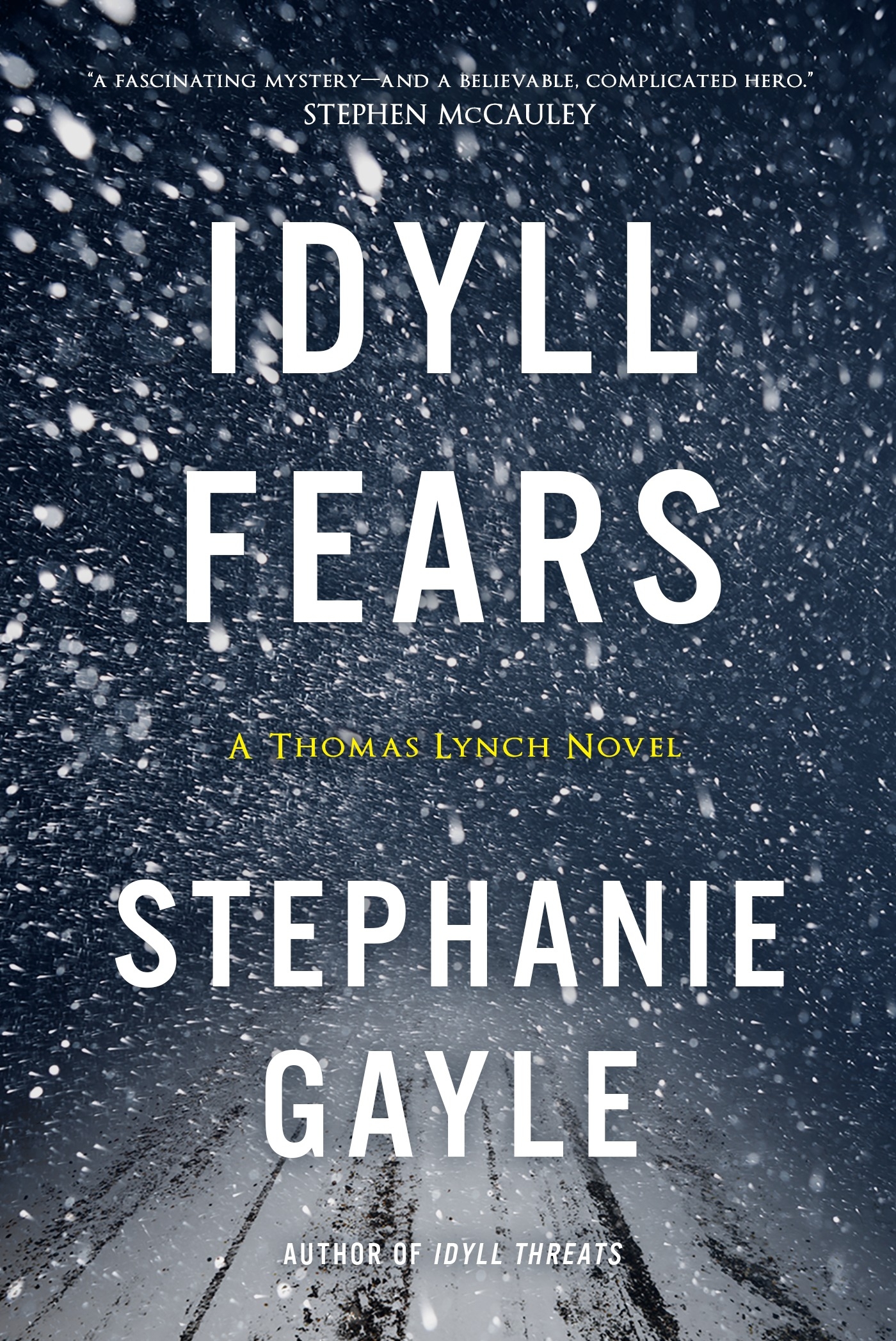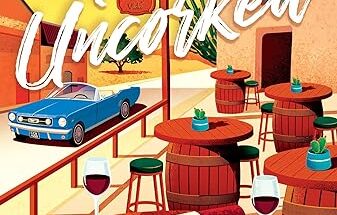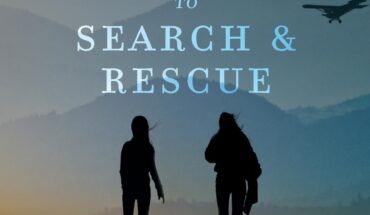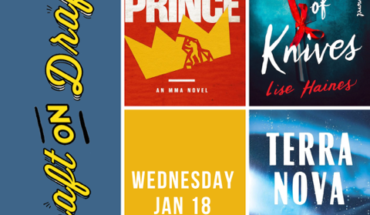 Stephanie Gayle is the author of the Thomas Lynch mystery series, which includes Idyll Threats and Idyll Fears, out today. Her first novel, My Summer of Southern Discomfort, was one of Redbook magazine’s Top Ten Summer Reads, and her short fiction and non-fiction have appeared in Kenyon Review Online, The Potomac Review, Punchnel’s, and several other publications. She has been twice nominated for a Pushcart Prize. She is also the co-founder of the popular Boston reading series Craft on Draft.
Stephanie Gayle is the author of the Thomas Lynch mystery series, which includes Idyll Threats and Idyll Fears, out today. Her first novel, My Summer of Southern Discomfort, was one of Redbook magazine’s Top Ten Summer Reads, and her short fiction and non-fiction have appeared in Kenyon Review Online, The Potomac Review, Punchnel’s, and several other publications. She has been twice nominated for a Pushcart Prize. She is also the co-founder of the popular Boston reading series Craft on Draft.
Dead Darlings spoke with Stephanie about Idyll Fears, the second in her mystery series featuring Thomas Lynch, a gay police chief working in a small town in Connecticut. Publishers Weekly says of Idyll Fears, “Fans of the first book will be delighted, and newcomers will find a new favorite.”
Stephanie Gayle will be celebrating the launch of Idyll Fears at Porter Square Books on Tuesday, September 5, 2015, 7:00 PM.
Dead Darlings: Thanks for joining us to talk about Idyll Fears. I read the first book in the series, Idyll Threats, on the worst day of my first bout of the flu. Chief Lynch is the only reason I look back fondly on that day. Idyll Threats and Mucinex: it’ll get you through the flu. I was happy to return to Idyll, this time without the accompanying aches and pains.
At the heart of Idyll Fears is the search for Cody, who goes missing on the worst snow day of the year. Chief Lynch and his team—including a new K-9 unit, I’m happy to report—are charged with finding him. Complicating matters, the missing boy has an incredibly rare condition, Congenital Insensitivity to Pain with Anhidrosis (CIPA), that prevents him from feeling pain. Which idea came first: the missing kid or the discovery of CIPA? This is my picture of what happened: you were vegging out on the sofa during Snowpocalypse 2016, flicking through the channels when you landed on an old episode of Sally Jessy Raphael about rare illnesses. Am I hot or cold?
Sort of cold on the inciting incident. I wasn’t watching an old episode of Sally Jesse Raphael when I was inspired. I’ve been carrying around the idea of writing about a child afflicted with CIPA for some time. As diseases go, it’s amazing and awful. A rare genetic disorder that prevents you from feeling pain. Pain, as it turns out, is super useful. It keeps us from burning ourselves and continuing to walk on broken bones. It also makes us empathetic to others’ pain. Imagine that you can’t feel pain. What’s to prevent you from hitting someone? After all, nothing hurts, right?
You are hot with Snowpocalypse 2016, though. I knew I wanted to up the ante with the missing kid plotline by adding horrible weather, and that stupid fucking winter gave me all the sensory details I needed. I would come inside from shoveling snow that was now in piles above my damn shoulder and I’d scribble notes like “teeth hurt” and “slick ice under snow” and “frozen boogers.”
To sum up, disease came first, and then the missing kid, and then the blizzard. They combined to form a perfect storm. (I’ll show myself out.)
I’m curious about—and a little envious of—the mental and story stamina of writers who work on a book series. I imagine it’s a different experience from your first book, My Summer of Southern Discomfort. Was it difficult for you to plunge back into the world of Idyll and Chief Lynch after the launch and promotion of Idyll Threats? Was it like a homecoming, or like you never left?
 Finding Thomas’s voice was easy, but the rest of it, even though I’d largely established the setting and cast of characters, wasn’t nearly as effortless as I’d hoped. I had a weirdly opposite problem. With Idyll Threats, I wrote the book not knowing who the killer was (not ideal, as systems go). But with Idyll Fears I knew exactly who did what and I found the first draft read as if I’d lit neon signs above all the guilty party’s heads.
Finding Thomas’s voice was easy, but the rest of it, even though I’d largely established the setting and cast of characters, wasn’t nearly as effortless as I’d hoped. I had a weirdly opposite problem. With Idyll Threats, I wrote the book not knowing who the killer was (not ideal, as systems go). But with Idyll Fears I knew exactly who did what and I found the first draft read as if I’d lit neon signs above all the guilty party’s heads.
The other part of writing a series you don’t think much about is that you’re writing a book about which people have expectations. It felt burdensome at times. Most days, I am excellent at keeping everyone else out of my mind palace, as Sherlock would say. With a series, sometimes there are knocks at the palace door. And you’d quite prefer the visitors would go the fuck away.
Chief Lynch is such a compelling, complicated lead. In Idyll Threats, he’s closeted. One thing I appreciate about his situation in Idyll Fears is that he’s out and going about his day and doing his job. Though a hate crime occurs, the focus of the story is on the missing kid, not on Chief Lynch’s sexuality. You walk that fine line between having a gay character who “just happens to be gay” but not have important pieces of his identity be erased, such as his sex life and general grumpiness about not wanting to be feted as the “gay police chief.” How important was it for you to ensure that balance?
Very important. If I wanted anything for Chief Lynch it was that he never be a victim or a saint. Too often, minority characters (by race, religion, sexual orientation) are sacrificed to make a point (nothing like dying to illustrate a moral position!) or held up as shining examples (how dare you be anything less than perfect). Thomas is one man and he’s complex. He doesn’t mind being gay, but he hates that it’s become the only thing people notice about him. He’d much rather they notice that he’s tall and handsome and good at his job. What’s funny about him is that, at his core, he craves love, not just romantic love, but friendship, camaraderie, but he loathes making himself appear as if he wants people to like him.
In Idyll Fears, the suspects and crime are knotted up and then expertly unravel throughout the course of the book to a thrilling conclusion. Mystery requires the ability to juggle competing threads and possibilities, always keeping the reader guessing. How do you maintain that element of surprise, especially for mystery fans who may have “read and seen it all,” so to speak?
One thing I’ve learned to do is to create plausible suspects who didn’t do it, but whom it takes time to clear as suspects. Red herrings, as we call them in the biz. I ask myself who seems the most likely culprit and then I’ll either play them up or down. I also like to establish witnesses and possible important clues early on and then gradually reveal why they matter. That said, I don’t torture myself making the bad guys “unguessable.” And I don’t try to write complex puzzle mysteries that are very intricate.
You and fellow Novel Incubator alum Emily Ross conducted a terrific session on writing mystery and suspense at this past year’s Muse and the Marketplace session. One question I didn’t get to ask is: what’s the difference between suspense, mystery, and thriller? Do those readerships co-exist? Are there reader expectations you have in mind when sitting down to write?
Those are three questions, Kelly. But because I am so generous, I will answer them all. (All truly generous people point out their generosity before sharing anything.)
I’m going to free associate my answer here.
- Thrillers are Bugatti Veyron. Pedal to the metal. They often employ a race against time element and quite often have military or political elements. They tend to be male dominated. Pacing wise, think Mad Max: Fury Road.
- Mystery is the largest catch-all genre descriptor so it covers a lot. They tend to have more developed characters, often recurring investigators. Pacing wise, think Jaws.
- Suspense is all about twists and shadowy turns you don’t see coming. Suspense might read more like non-genre fiction with lots of aha! moments toward the end. Pacing wise, think The Sixth Sense.
These readerships definitely co-exist as some writers do two or more categories within their writing. One novel could be classified as one or more of these categories. It’s confusing (even to mystery writers).
As to reader expectations I have in mind: readers love Thomas so don’t kill him. Also, they expect a mystery so don’t make the solution too easy. These seem super obvious, I am sure, but I’m very good at missing the obvious.
In another Dead Darlings interview, you mentioned that you’re not an outliner. You also mentioned, “With the book I’m currently writing I know who the bad guy is, but I still suspect I’ll end up inserting many of the clues in later drafts.” Forgive the musical reference—you brought this upon yourself when you sang Sarah McLachlan’s “Angel” while fundraising at the Craft of Draft reading series—but what was your process for “building the mystery” in Idyll Fears?
It’s so kind of you to refer to that performance as “singing,” Kelly. I’ll use Idyll Fears as my example. My process looks like identify and draft the following story elements:
- Primary crime (kidnapping)
- Related crime as a result of primary crime (arson)
- Secondary crime (hate crime/graffiti)
- Figure out who did all the crimes
- Create plausible red herrings
- Work on the stories that pertain to the Chief’s personal life/evolution—make sure they tie into the mysteries, if only tangentially
- Work out the timeline (badly—god, I really messed it up—so many apologies due to my editor and copy editor)
- Smooth out the clues so they don’t point at the actual committers of said crimes (as in draft one)
- Build up the red herrings/Work on personal life moments as these always need finessing
- Let tension build before you deflate it
- Reorder events so no one crime is ever dropped for a long period of time (otherwise it jolts the reader out of the story)
- By the same measure, don’t drop major characters from the narrative
- Edit/swear like a sailor, repeat
Speaking of the writing process, John Gardner says, “. . . one of the chief mistakes a writer can make is to allow or force the reader’s mind to be distracted, even momentarily, from the fictional dream.” But before that can happen, a writer needs to stay in a similar space. Are there any techniques or habits you’ve come to rely on over the years to keep yourself in that fictional dream while constructing your own narratives?
I rely on my fierce and unflinching work ethic, which I inherited from my dad. I’m the cruelest of taskmasters. I will deny myself basic stuff: food, showers, until I reach writing milestones. I’ve also stopped listening to music with lyrics when writing. It’s too distracting for me. I can and do listen to ambient music. The Productive Music list in Spotify is my go to. When I hear it my brain sort of goes, “Oh. Time to work.” But it can be tough to stay in your fictional headspace, especially when you have a job or loved ones or a pet who depends on you to sustain its life. I like to write at home because it works for me. But let me stress this: if you like writing in cafes or listening to Britney Spears when you write and that works for you, do that. Writing habits vary widely among pros. So, you do you.
So many authors have their big name influences. I certainly do. But I also like to pay tribute to those who are lesser known, or less common, authors who captured our junior high hearts. For me, it’s Lucia St. Clair Robson and V.C. Andrews, for whom we share a love of My Sweet Audrina. Are there any “guilty pleasure” authors—though, I feel no guilt or shame—who have impacted you as a writer?
I am also shameless. One of my biggest pet peeves is the phrase “trashy romance novel.” Let me tell you, I have learned a lot about pacing and story and plot and genre and historical details and crossword puzzle words from romance novels. Plus, sex!
My junior high influences definitely include V.C. Andrews and Phyllis Whitney. She wrote gothic mysteries and I used to borrow one or two per library trip. (Yay, public libraries!!) Stephen King. I read so much horror in my teen years.
Did I ever tell you my teenage plan to marry a man named King so my name would be Stephanie King and that way my books (because I was going to be writer) would be on the shelf before (because, alphabet) Stephen King’s? [Ed. note: She did.] Clearly, I wasn’t aware I didn’t have to marry a dude to change my name. Ah, sweet young me.
In junior high, I subscribed to a book of the month clubs aimed at teen girls and god damn I wish I had kept those novels. Some of them were mysteries. In one, the protagonist is chosen to intern at a girls’ magazine (think Seventeen) and she’s in a competition against three other interns. There was city living and love interests and backstabbing and juvenile delinquency and probably an eating disorder.
I love that you thank Mercedes Hightower, a Goodreads reviewer, in your acknowledgments. I remember reading her enthusiastic review of Idyll Threats and emailing you to ask if you’d seen it. So many authors cringe when Goodreads is mentioned. Any advice for fellow authors—about to launch or aspiring—for dealing with reviews, positive or otherwise?
Yes. Don’t read your reviews unless your publicist or partner or trusted friend tells you they’re good. Unless you enjoy suffering. In which case, have at it you bloody masochist.
I read that Goodreads review because someone told me about it. I don’t generally wade into the waters of public feedback. I know that bad reviews take an emotional toll and that a lot of reviews can be distilled to “not for me” which, while I totally respect, I’m not going to do anything about. So why bother?
Will we be hearing from Chief Lynch in the future? What’s next for you?
Yes, because I signed a contract for another book! And because we have yet to get to the era of Queer Eye for the Straight Guy and Thomas is going to have soooooooo many feelings about that show.
I’m putting finishing touches on a non-Idyll mystery now. Because, apparently, I had a dream in which George Michael (who is an angel now, obvs) told me to write ALL the books. Okay, I just made that up but now I want it to happen. Badly. After I finish that book, it’s on to book #3 of Idyll and keeping up with documenting the fabulosity that is my newly adopted Holland lop bunny, Bao. Check him out on Instagram, at Bao_pinkergayle. That’s right, my bunny has an Instagram. Welcome to the future, kids.
Also, because most writers are avid readers, what’s on your To Be Read list? What are you reading?
I am reading The Fact of a Body. It’s that book that everyone praised and which deserves all that praise and more. It’s about criminal law and the death penalty (passion topics of mine) and human connections and abuse and recovery. It’s so fucking good. If I were Alexandra Marzano-Lesnevich I’d retire from writing because that book is so amazing I’d literally dust my hands, scream, “You’re welcome” and binge watch television.
I have Mackenzi Lee’s Gentleman’s Guide to Vice and Virtue, Mary Roach’s Grunt, and Robin Yocum’s A Brilliant Death, all on tap.
Along with launching Idyll Fears at Porter Square Books, Stephanie Gayle will also read and discuss suspense with fellow Novel Incubator Alum and Dead Darlings Site Editor Kelly J. Ford and Dead Darlings guest contributor Crystal King at the next Craft on Draft event on October 3.
For more information on Stephanie Gayle, including future book event dates, check out her website.



